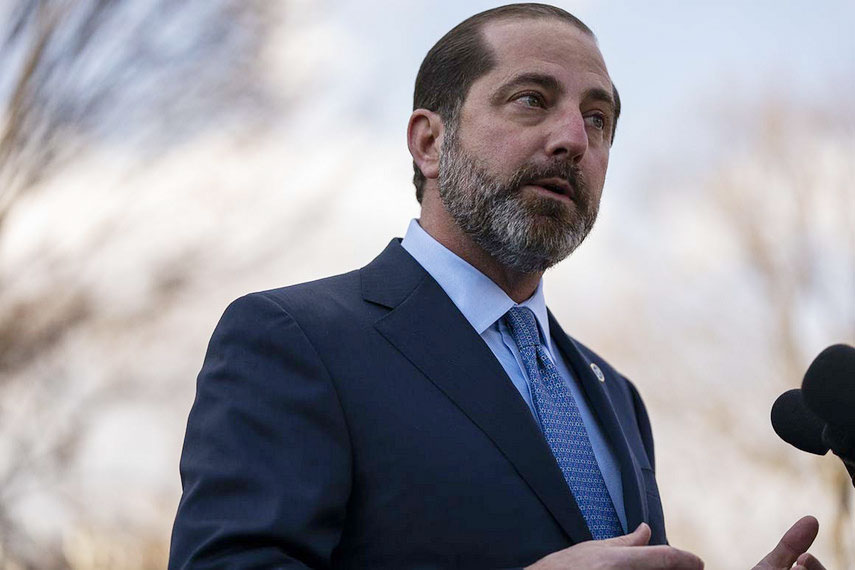
But two individuals said Redfield was wrongly being set up by some HHS officials as the fall guy for the administration’s biggest coronavirus misstep — the lab-testing failure — arguing that the CDC chief had worked to speed the tests while advocating for a fallback lab-testing option but was waiting on Azar’s permission to move forward on Plan B. “He’s great on this,” said one senior administration official, adding that Redfield is “busting his ass with a very hard job [and] working harder than any other senior official at HHS.”
An HHS spokesperson said that CDC was taking steps to improve testing. „CDC and FDA have been working together to correct the issue with the diagnostic in a timely manner and worked together to make alternatives more readily available that meet the appropriate accuracy standards for testing,“ the spokesperson said.
The health department’s slow response also has set off finger-pointing among top officials and Azar’s deputies, reigniting longstanding feuds at a crucial time when the Trump administration needs to work in lockstep. Officials at CDC and Robert Kadlec, the HHS assistant secretary for preparedness and response, have jockeyed over coronavirus quarantine rules and evacuating at-risk Americans, the latest skirmish between two agencies that have spent years battling over which gets to be in charge of the nation’s emergency medical stockpile.
White House officials also have clashed with Azar and accused him of giving overly optimistic guidance to Trump, a battle that dates back a year and has encompassed numerous policies. Meanwhile, an HHS whistleblower and an FDA scientist have stepped forward to warn that the department’s coronavirus response has been disorganized and could put Americans at risk. Azar has said he supports whistleblowers and vowed full investigations.
The disjointed, at times chaotic coronavirus response has alarmed allies of the HHS secretary, who worry Azar will ultimately shoulder much of the blame within the administration and from the public for failing to contain the outbreak.
The public health crisis threatens to become the defining episode of Azar’s tenure, people close to him lamented in recent days, overshadowing more than two years of work on various policy initiatives and linking his legacy as health secretary to the administration’s struggles to combat a fast-spreading virus that could linger for months — potentially infecting thousands, disrupting Americans’ daily lives and grinding to a halt the once-strong economy that Trump officials view as key to the president’s reelection.
“Right now, there’s probably hundreds or low thousands of cases … that aren’t reported yet,” Trump’s former FDA Commissioner Scott Gottlieb said on “Face the Nation” Sunday, referencing a new estimate of spreading coronavirus in Washington state. “One of the mistakes, one of the challenges was getting the diagnostic testing in place.”
Having failed to track and quash isolated cases, it may be too late to now guard against a widespread outbreak of coronavirus in the United States. Health officials have increasingly shifted their mindset from “containment” — stopping the virus altogether — to “mitigation,” or preventing the virus’ worst effects on Americans. Chris Meekins, a former Trumpossip administration HHS emergency-preparedness official, on Sunday said the risk of significant U.S. outbreaks had risen from 33 percent to 75 percent in the last week alone.
Azar’s job is not believed to be in imminent jeopardy, people close to the White House said, in part because firing the nation’s top health official in the midst of an outbreak would prompt further questions about the administration’s response effort.
But Azar — who already has few friends within the White House, which weighed a list of potential replacements in December — has been further weakened internally by his brief period leading Trump’s coronavirus task force, during which he battled repeatedly with national security staffers over strategy and frustrated White House officials who at times questioned whether he was withholding information.
Meanwhile, Azar’s attempts to publicly play down the risks of the virus — saying for weeks that there were just more than a dozen U.S. cases — were criticized by some officials as too optimistic at the time and, in retrospect, seen as incautious. The HHS secretary repeated the message across four congressional hearings last week and national TV briefings, even as it turned out the virus was silently spreading in the United States.
“Focusing on just 15 cases was a tragic health care disservice,” said a former HHS official. “Hospitals and health providers needed to know about the risks and get ready to take more steps.”
Sarah Karlin-Smith contributed to this report.
Source: politico.com
See more here: news365.stream






